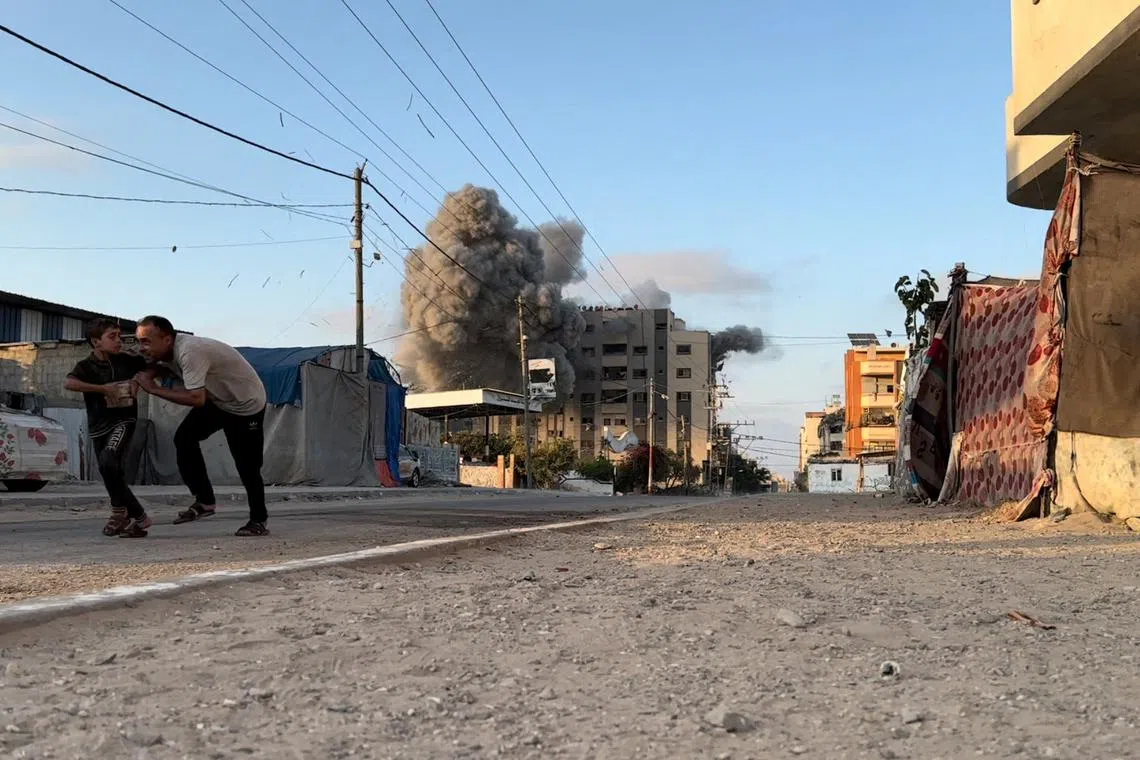Blinken to push for Gaza ceasefire; Israel launches fresh strikes
Sign up now: Get ST's newsletters delivered to your inbox

People running as smoke and flames rose following an Israeli strike on a residential building in Gaza on Aug 17.
PHOTO: REUTERS
Follow topic:
CAIRO – Israeli strikes killed at least 21 people in Gaza on Aug 18, including six children, the Palestinian health authorities said, ahead of a visit to the region by US Secretary of State Antony Blinken to try to push forward ceasefire talks.
The children and their mother were killed in an Israeli air strike on a house in the central town of Deir Al-Balah, health officials said.
There was no immediate comment from the Israeli military.
The Israeli military said it destroyed rocket launchers used to hit Israel from the southern city of Khan Younis, the scene of intense fighting in recent weeks, and killed 20 Palestinian fighters.
Diplomatic efforts to halt the Israel-Hamas conflict and secure a deal to return hostages held in Gaza have intensified in recent days.
Negotiations mediated by the US, Egypt and Qatar are set to continue next week in Cairo, following a two-day meeting in Qatar’s capital Doha this week.
Mr Blinken is making his 10th trip to the region since the war began, days after the US put forward bridging proposals that the mediating countries believe would close gaps between the warring parties.
There has been increased urgency to reach a ceasefire deal amid fears of a regional escalation.
Iran has threatened to retaliate against Israel after the assassination of Hamas leader Ismail Haniyeh
At Al-Aqsa Hospital in Deir Al-Balah, relatives gathered around the bodies of the mother and her six children, who were wrapped in white shrouds bearing their names. The youngest was 18 months old, the children’s grandfather Mohammed Khattab told Reuters at the funeral.
“What was their crime?... Did they kill a Jew? Did they shoot at the Jews? Did they launch rockets at the Jews? Did they destroy the state of Israel? What did they do? What did they do to deserve this?” said Mr Khattab.
Israel has denied targeting civilians as it hunts down Hamas militants, accusing the group of operating from civilian facilities, including schools and hospitals. Hamas denies this.
Ten months after the war began, Palestinians in Gaza are living in constant fear and desperation to find a safe place.
“There is nothing left to us but the sea,” said Mr Tamer Al-Burai, who lives in Deir Al-Balah with several extended family members.
“We are tired of displacement. People are being pushed into narrow areas in Deir Al-Balah and Al-Mawasi, which have become pressure cookers,” Mr Burai told Reuters via a chat app, adding that Israeli tanks were just 1.5km away.
“No one knows where to go if the tanks keep coming.”
On Aug 16, the military ordered the evacuation
The United Nations Office for the Coordination of Humanitarian Affairs said the Aug 16 orders, which included other enclave areas outside the humanitarian zones, had reduced the size of the “humanitarian area” designated as safe by Israeli forces to about 11 per cent of the total area of the Gaza Strip.
The Deir Al-Balah municipality, estimating the current population in the city at one million, said the evacuation orders meant more people were being crammed into a smaller space.
Additionally, water shortages loomed as several water wells and tankers that used to provide residents with 60 per cent of supplies are located in the areas under evacuation orders, the municipality said in a statement on Aug 18.
Mr Blinken is expected to meet Israeli Prime Minister Benjamin Netanyahu and other senior officials.
Mr Netanyahu’s office described the talks as “complex” and said it was “conducting negotiations, not giving way in negotiations”.
Israel remained firmly committed to principles established for its security in the May 27 outline proposals, it said in a statement following a Cabinet meeting.
“I would like to emphasise: We are conducting negotiations and not a scenario in which we just give and give,” Mr Netanyahu told the meeting. “There are things we can be flexible on and... things that we cannot be flexible on, which we will insist on.”
“Strong military and diplomatic pressure are the way to secure the release of our hostages,” he said.
Hamas said optimistic US comments were “deceptive”, and accused Mr Netanyahu of making new conditions in an attempt to “blow up” the negotiation.
While details of the negotiations have not been made public, there have been differences over several key issues.
Disagreements include over whether Israeli troops should remain in Gaza after the fighting ends, notably along the so-called Philadelphi corridor on the border with Egypt, and over checks on people going into northern Gaza from the south which Israel says is needed to stop armed militants.
Hamas has pushed for a ceasefire deal to end the war, while Israel has not been willing to agree to go beyond a temporary pause in the fighting.
The war erupted on Oct 7 when Hamas fighters rampaged into Israel
Israel’s subsequent military campaign has killed over 40,000 Palestinians, mostly civilians, according to the Palestinian health authorities, and reduced much of Gaza to rubble. Israel says it has killed 17,000 Hamas fighters. REUTERS

